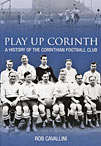 A History of the Corinthian Football Club
A History of the Corinthian Football Club
by Rob Cavallini
Stadia, £17.99
Reviewed by Harry Pearson
From WSC 255 May 2008
Founded in 1882, Corinthian Football Club took their name not from the Greek city-state, but from a word meaning “a man of fashion and pleasure”. And right from the start pleasure was an integral part of the Corinthian ethos, with failure to attend any of the lavish meals presented to the team on their trips around Britain likely to result in a player’s expulsion from the club.
As a consequence, during the course of Rob Cavallini’s entertaining history of one of the world’s most elite (and elitist) sporting institutions, matches slip by in a dizzying whirl of cherry brandy, dinners with the Bishop of Durham, sherry, rousing sing-songs, whisky, seven-course banquets at the Grand Hotel, champagne and the occasional violent altercation with oafs, hooligans and the sort of gentlemen who insist on “telling stories of the dirty-without-being-funny order” followed by a bumper of good Madeira. As with many accounts of the lives of Victorian and Edwardian sportsmen, at times Play Up Corinth leaves the reader feeling like he has a nasty hangover coming on.
Not that the football was neglected. During Corinth’s Edwardian heyday, the club’s roster of players included many stars – walrus ’tached gentlemen with stern chins, and hairy forearms protruding from woollen jerseys, posed in the photos that illustrate the text in a manner that teeters precariously between Hero of Empire and gay beefcake. Among them were C Wreford-Brown (inventor of the word “soccer”); CB Fry (whose many accomplishments include being called on by Adolf Hitler for advice on organising the Hitler Youth. Fry suggested the Führer introduce the future of the master race to cricket); and RC Gosling, described by contemporary newspapers as “the richest man ever to play football for England”, although its likely that even a fringe member of Fabio Capello’s squad now has more funds at his disposal.
And despite the lobster lunches and bottles of chilled Hock, Corinthians were noted for “never slacking” and always playing to win. They took on and defeated many of the best professional clubs. In 1897 Scottish champions Celtic were swatted 4-0. Seven years later Manchester United took an 11-3 hiding.
While it is the club’s ideals that have lived on in popular conception, during their glory years Corinthians’ style of play had the greater influence. Described as “unique” this was – according to contemporary accounts – based on “straight-ahead theory” involving “a good open game without crowding”, but with “crisp passing”, “shooting from all angles” and “plenty of hard charging”.
The sight of the Corinthians in full flow had a profound impact on the game globally, because during the years leading up to the Great War the little club from Tolworth embarked on extensive overseas tours. In Hungary and Sweden they named national cup competitions after them, Real Madrid adopted white shirts as a tribute, while Corinthians of São Paulo took their name.
Of course Corinthians could only wander off this way because of the social and financial situation of the club’s players, an unwritten law ensuring membership solely for “Old Public School Boys and members of a university”. The author notes, apparently without irony, that this “prevented any uneducated, unsavoury characters from infiltrating the club… and tarnishing its reputation”. Funnily enough MI5 once took a similarly complacent view, then along came Philby, Burgess, Maclean and Blunt. It’s the one blemish on an otherwise handsome volume.